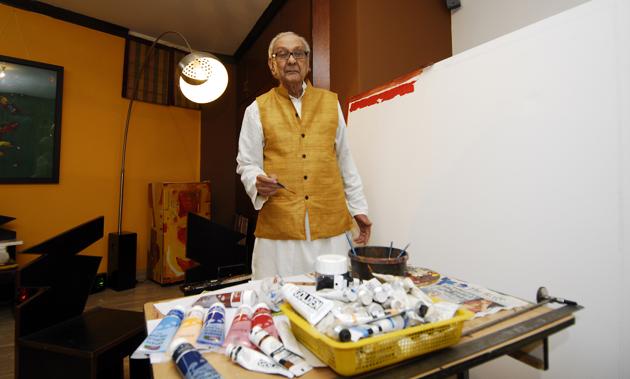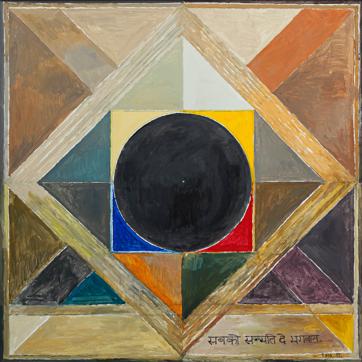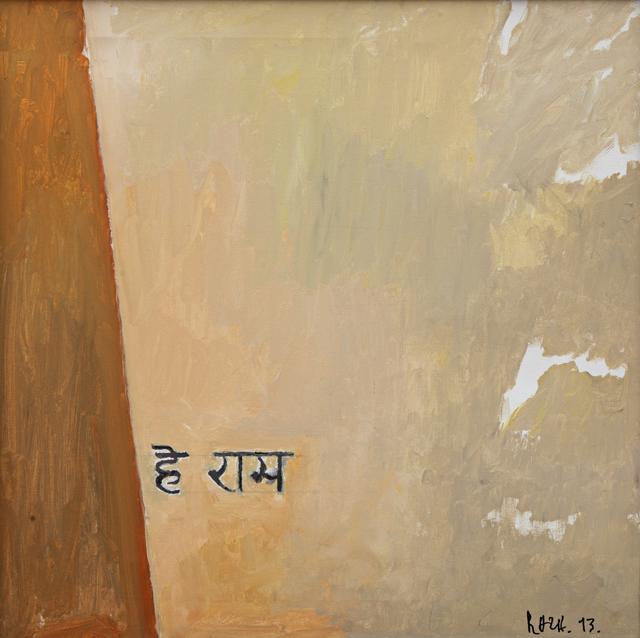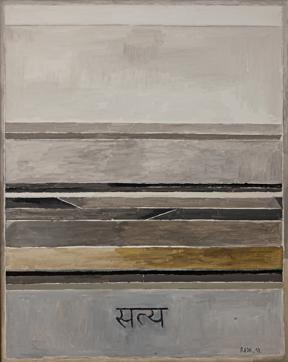SH Raza’s paintings and the essence of Gandhi’s philosophy
Mahatma Gandhi was a subject painter SH Raza returned to repeatedly so that he could capture the essence of his philosophy - from pain to peace
Mahatma Gandhi once said that if one was looking for peace one would find it within. For decades, Sayed Haider Raza drew along those lines, confining the idea of peace to a dot (bindu), and centralising, in his abstract works, the journeys that the human condition took. The veteran artist created a set of paintings dedicated to the Mahatma in 2013, just three years before his death. Gandhi in Raza, a collection of seven paintings currently exhibiting at the Akar Prakar Gallery in Delhi, is Raza’s homage, not in particular to the man or his symbolism, but to elements he considered essential to understanding and attaining his idea of peace.

The number seven in itself has significance in this context. “He had first planned a set of ten, but when I met him and asked him to paint on Gandhi he settled on seven,” says Ashok Vajpeyi, veteran poet and a close friend of Raza. “And you can see the paintings themselves have a rhythmic sense to them, like the saptswaras,” Vajpeyi adds. The paintings have been curated in such a way that the exhibition starts with the one Raza made to mark Gandhi’s assassination. Called Hey Ram this was the first creation in the series, which ironically, begins with the end. “Raza kept returning to the Mahatma long after he had been assassinated. He said to me in an interview that his death was the saddest moment in the country’s history,” says Vajpeyi.

What makes the collection come together is the spine of four paintings titled Peed Parai, Sanmati, Satya and Shanti: Pain, Prayer, Truth and Peace; evidently, what Gandhi often considered or was most concerned with as far as his philosophy of living goes. “The exhibition, seven months after his death, is not only a tribute to Gandhi, but to his own life and ideals, his swadharma,” Reena Lath, Director of Akar Prakar, says. The sombreness of Raza’s tones and shades in this collection point to a man well aware of his own approaching end. Also of what was happening around him. “Though Raza wasn’t extremely political, he was incredibly conscious of the things happening around him,” Reena adds. The relevance of his last paintings confirms it.
Inward journeys
A closer look at the four paintings that form the nucleus of the collection offers an insight into Raza’s philosophy. Shanti is an inward journey towards the elusive bindu at the centre and because it is circular, it happens to have no restriction on points of entry. The painting can therefore be entered from any direction, and it points to the universality of peace, equally accessible to all, as long as they find their journeys point inward.
In case of Sanmati, the bindu appears confined by geometric structures, appearing restrictive though vividly coloured. Raza invokes the multi-cultural nature of our being (especially that of India) of Gandhi’s belief that though the destination was universal, the journey to get there would be different for different people. Vajpeyi confirms that Raza never clung to one doctrine or restricted himself to one religion. He went to mosques, temples and churches and felt at home in each place.
Peed Parai and Satya deal with difficult subjects. While truth has its layers, which is perhaps more true than ever, given the world’s current political context, pain is not only layered but also, significantly fractured. It is sometimes personal, sometimes merely a reaction to something external.


The last two paintings Swadharma and Thoughts of Gandhi ji, are inscriptions and they provide textual reference to those who might find themselves lost in the abstracts.
To someone who is subconsciously driven towards the idea of entropy, Raza’s work might be difficult to connect to. In that case the 80-page book that supports the exhibition, featuring essays by Vajpeyi, Gopal Krishna Gandhi and Nandalal Bose might help. That said, there remains in Raza a universal and simply articulated sensibility, that even at 92, he hadn’t lost his grip over.“It is amazing to think that 92-year-old painter could still address, and reassert his presence in Art. What he says through the paintings is what is under constant attack around us today,” Vajpeyi says as he sums up the collection. In Hey Ram, there is a noise of solid colour entering from the left of the frame. It stops somewhat prematurely. What is left is a void, the afterlife.
QUICK FACTS:
What: Gandhi in Raza
When: Till March 31, 11am-7 pm, Sundays closed
Where: Akar Prakar Gallery, 9, 29 Hauz Khas Village
Nearest metro station: Green Park





